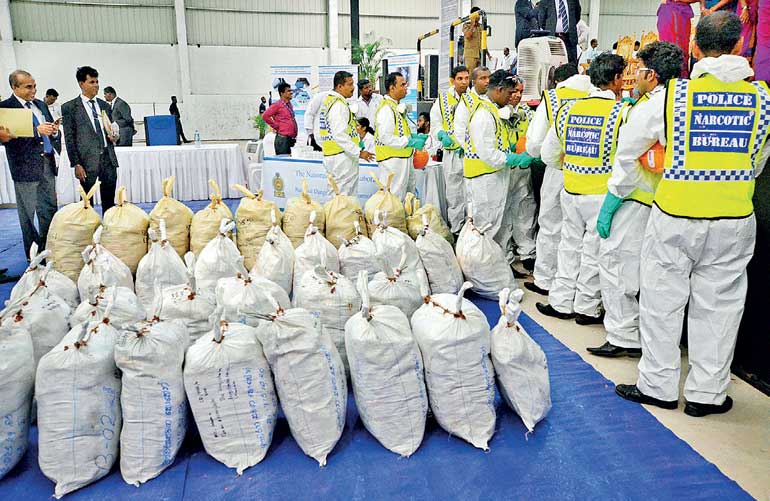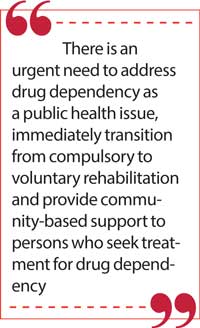Tuesday Feb 24, 2026
Tuesday Feb 24, 2026
Tuesday, 10 August 2021 03:04 - - {{hitsCtrl.values.hits}}

In Sri Lanka, people who use drugs or have a drug dependency are demonised and dehumanised and portrayed as a public threat. Since they are seen as undesirable outcasts, the violation of their human rights does not generate a public outcry, and is instead almost deemed necessary to rid the country of the ‘menace of drugs’ – Pic by Shehan Gunasekara
 ‘Broken System: Drug Control, Detention and Treatment of People who Use Drugs in Sri Lanka’ focuses on the impact of drug control, detention and treatment in Sri Lanka on the protection and promotion of human rights.
‘Broken System: Drug Control, Detention and Treatment of People who Use Drugs in Sri Lanka’ focuses on the impact of drug control, detention and treatment in Sri Lanka on the protection and promotion of human rights.
This article is summary of my report, that was published by Harm Reduction International, which discusses both the international legal and national legal frameworks and highlights structural and socio-economic factors that result in the rights violations of persons who use drugs/have a drug dependency.
The context within which the report is situated is the global war on drugs that has resulted in grave human rights violations. In Sri Lanka, this is also connected to militarisation, which paradoxically escalated after the conclusion of the armed conflict in 2009. At present, it appears it is the Ministry of Defence that is not only driving the ‘war on drugs’ but is also involved in the treatment of persons who are deemed to have a drug dependency, which should be led and crafted by the Ministry of Health.
In Sri Lanka, the media enables the Government’s war on drugs through the negative portrayal of people who use drugs, and engages in fear-mongering about the growing ‘drug menace’. People who use drugs or have a drug dependency are demonised and dehumanised and portrayed as a public threat. Since they are seen as undesirable outcasts, the violation of their human rights does not generate a public outcry, and is instead almost deemed necessary to rid the country of the ‘menace of drugs’.
Systemic factors that enable rights violations
A number of systemic shortcomings in law and practice create space for gross misconduct and malpractices within the Police Department, which impact the rights of persons arrested for drug-related offences. The use of torture in police custody, specifically against persons arrested for drug-related offences, is a widely documented phenomenon, including in decisions of the Supreme Court. No action is taken against officers who perpetrate violence, which creates a culture of impunity within the Police Department. In recent months there have also been a spate of deaths in custody of persons accused of drug trafficking.
The lack of oversight and accountability create space for police officers to interfere with investigations into drug-related cases, by falsifying crucial details with regards to the timing of arrest, tamper with the chain of custody for drugs seized and even intentionally cause the trial process to be delayed. This results in persons remaining in pre-trial detention for prolonged periods of time. In 2020 several officers of the Police Narcotics Bureau were arrested for corruption and involvement in drug trafficking.
There are multiple laws related to drug control, detention and treatment that contain contradictory provisions, which leads to arbitrary and disproportionate outcomes as they give considerable discretion to the police and Judiciary.
For instance, according to lawyers representing persons arrested for drug offences, the police do not file cases involving heroin, cocaine and cannabis under the Convention on Illicit Traffic in Narcotic Drugs Act, although the Act applies to offences involving the aforementioned three drugs. This is reportedly because this law is less punitive, i.e. the penalties are less harsh and arrested persons may be able to obtain bail from the Magistrate’s Court.
This creates space for those who have the financial means to possibly influence, including through financial means, to be charged under the law with less harsh penalties, while the poor and marginalised would be charged under the harsher law. Another example is, the Poisons, Opium and Dangerous Drugs Ordinance under which a person in possession of 2g of heroin can be sentenced to death.
When the case is filed under Section 54A of the Poisons Opium, and Dangerous Drugs Ordinance, a person cannot obtain bail at the Magistrate’s Court and bail can only be awarded by the High Court under exceptional circumstances according to the Act. Thus, the section under which the police initially report facts to court is crucial, because when cases are filed under Section 54A, the person may spend several months or years in remand until they are granted bail by the High Court. The inability to obtain bail has also led to prison overcrowding and inhumane and degrading living conditions in prisons.
 Treatment or punishment?
Treatment or punishment?
Where drug treatment is concerned, the Drug Dependent Persons (Treatment and Rehabilitation) Act of 2007 empowers the police upon receiving information (from anyone) that “any person is a habitual user of dangerous drugs and has since become a drug dependent person” to send the person for a medical assessment and thereafter produce the person before a Magistrate. The Magistrate can send the person for compulsory drug rehabilitation on the basis of a medical assessment of ‘drug dependence’.
Empowering law enforcement agencies to apprehend and detain persons they suspect ‘have become drug dependent’, equates to providing the police with the power to arbitrarily deprive persons of liberty without due process. Further, it empowers law enforcement to make determinations on a person’s health condition, which they are not qualified to do.
In Sri Lanka there are State-run as well as private drug treatment centres. Upon admission to a treatment centre, no psychological evaluation is conducted. Harm reduction as well as evidence-based individualised treatment are notably absent from the treatment. The daily programmes are mandatory, including for those who experience withdrawal symptoms. This non-scientific approach to treatment also reflects the National Dangerous Drugs Control Board’s erroneous belief that drug dependence is rooted in “weaknesses in the individual personality”, which is attributed to factors such as “birth inabilities, nature of family, society, environment and economic factors”.
There are two centres within the purview of the Ministry of Justice’s Bureau of Commissioner General Rehabilitation (BCGR): Kandakadu Drug Treatment Centre (KDC), and Senapura Vocational Training Centre, both run by the army. Persons who are sentenced to compulsory drug rehabilitation for one year by courts as an alternative to imprisonment are admitted to KDC for six months and thereafter sent to Senapura Vocational Training Centre for other six months.
Violence and ill-treatment are reported as part of punishment or for no apparent reason at these centres. Any mistakes or disobedience can result in being beaten up, hit with wires, being forced to do push-ups or other forms of exercise. In one particular case, a person involved in a fight said he was punished by being handcuffed to a tree for three days, during which he had to remain standing the entire time and was released only to eat and use the bathroom. Food and water were brought to him, and he was not allowed to sleep.
The need for a public health approach rather than a punitive process
In its 2015 study on the effectiveness of treatment centres, the National Dangerous Drugs Control Board (NDDCB) reported that 64% of the sample group resumed consuming drugs following the conclusion of the treatment programme, indicating a high rate of relapse. The report of a NDDCB study conducted in 2017-2018 found that of the 170 persons interviewed, 123 began re-using drugs after State-mandated compulsory treatment, pointing to the ineffectiveness of compulsory treatment.
The lack of post-release support exacerbates the challenges persons released from these centres encounter. They face stigma, which hinders social reintegration and limits livelihood opportunities, as well as harassment by the police. The urgent need to address drug dependency as a public health issue, immediately transition from compulsory to voluntary rehabilitation and provide community-based support to persons who seek treatment for drug dependency is expressed succinctly by a person who was sent to compulsory rehabilitation as follows:
“Rehabilitation is not for a few weeks or months; it is for one’s whole life. The State doesn’t realise or know this. They think sending addicts to prison will fix it but they come out double addicts (more addicted than before). If you go to prison, your wife is likely to leave you. Your family breaks down. Then you leave prison and come back to no family and have no support system. The problem with KDC is that despite being a rehabilitation programme, after being released from Senapura you are sent back to prison for a few days. There you have to start at the bottom and sleep in the toilet because you are new. So, the stress of that makes you want to take tobacco or drugs available in prison. The whole year is useless if you are sent to prison after release. The whole year is undone within a day in prison. So, there is no point to the rehabilitation programme. It is better to give that money to other organisations that are actually able to help people. They need to give people treatment but their treatment methods do not work. They think that by working hard, manual labour, the addiction will leave your body.”
Full report can be accessed at: https://www.hri.global/drug-control-sri-lanka.